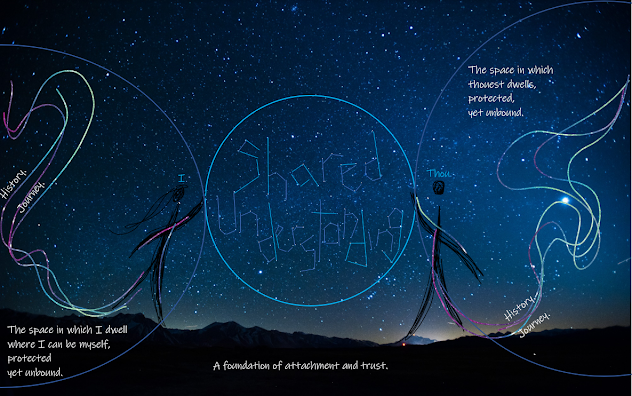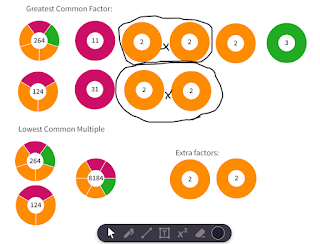The Teacher-Researcher in Space, Time, and Ethical Commitment
I created this illustration after reflecting on the ideas of Ted Aoki, Carl Leggo, Sandra Styres, and the Martins--Buber and Heidegger--in EDCP 562. I see myself in it, holding a space for Shared Understanding (Commitment? Creation? Action? Dialogue?) along with the professionals (and children and other humans in my life) with whom I interact. I'm the one on the left with the hair. This illustration is the focal point of this reflective activity in which I will probe my identity as a teacher-researcher through time, space, and ethical commitments.
History and Journey: Myself in Time
The iridescent energy streams shooting out of my feet are symbolic of the paths of personal history and professional journey that constitute my past. They look a little like a time-lapse photo of the stars shifting in the night sky--an illusion caused by the spinning Earth. Perhaps my own history and journey are like that, too: the illusion of unified narrative movement from one moment to the next when really it is I who moves and changes.
At the outset of this journey in graduate-level education, I wasn't sure what to bring with me (other than my wits and some self-confidence), but I was anticipating a marvelously interesting and strenuous journey. It had been a long time coming: I watched many others take the journey and I felt like less of a professional for having never taken a step beyond the here-and-now of the classroom, staring longingly out of the window. All of my colleagues have their masters and some are even working away on their very expensive Ed.D's. At the time, it was difficult to confess my lack of education to them. I let them reminisce about their journeys and largely kept my mouth shut.
At the time, I was also new to the path of mentoring fellow teaching professionals. I had been a very committed elementary classroom teacher for eighteen years before. I think the best thing about my work with children was how completely I valued who they were as individuals and how hard I tried to make them aware of just how important they were. My favourite, heart-bursting memories of students came when we seemed to really see each other after a tough slog together, maybe due to lack of confidence, or struggles with behaviour or learning or family troubles. I recall determined nods and looks of "I've got this and I know you're with me."
I really did like them. My favourite class year after year was the one that I had just taught. It always took me a couple of months to love the new group, but when I did, they became my favourite by far.
How would I feel now as a mentor of professionals? Why on earth did I leave the classroom when my heart was with my students year after year? Could I ever love big, old, and sometimes very annoying adult colleagues as much? I wasn't sure that I could.
Over the past two years, it is very clear to me that I genuinely like and value teachers in the field, too. And I really like all of them. Even the most annoying, loudly-opposed-to-progressive-ideas, stick-in-the-mud, pain-in-the-ass teachers are great. I give them explicit permission to call bullshit on me and my hair-brained ideas, so long as I can come to their classes and give whatever ideas I have a shot. And this totally wins them over. They rarely call bullshit--instead, they respond very well with contributions for improvement and then they become part of the team. They are people that I call on for opinions and leadership regularly.
Sounds so amazing, right? Talk about self-reporting. Know that I am still chipping away at this. Many teachers still close their doors to me, but far fewer than at the outset of the journey. I have a lot of hope that they'll eventually open.
Did this Masters program have anything to do with this growing connection? Actually, it did. Cynthia and every other instructor (including you, Tim) modelled this openness and love all of the time: love and respect for us, and love for the ideas. Every course we took pushed the boundaries in some way and we were always invited to contribute our opinions, feedback, and ideas to further expand these boundaries that were being pushed. I felt valued and respected as a person. Yes, the grading structure interfered with that somewhat and caused an explicit power-imbalance, but it was clear that wasn't the intention of any of our guides on this journey. The openness modelled fueled my own connections with my own colleagues and it will be a piece of learning I keep with me always. I also am no longer afraid to tell my colleagues in Staff Development and teachers in the field that I am presently working on my Masters. I feel really lucky and people seem genuinely pleased for me.
And the future? I have a list of next steps. Here they are:
- Work with Susan Gerofsky to refine my presentation for the Bridges Conference in Helsinki.
- Stay connected with Susan so that we might collaborate on future math films. We have different styles, but can perhaps learn from each other. Her latest film about building sand labyrinths on Hornby Island was beautifully produced.
- Continue to build resources and present with Cynthia, Jo-ann Archibald Q'um Q'um Xiiem, Joy Fast, and Sandra Fox regarding Indigenous Storywork and Mathematics.
- Figure out a way to stay in touch with everyone from this cohort. Perhaps I can lure a few people away from their districts to become part of my team in Coquitlam.
- Continue the learning with the team I presently lead. Perhaps we can write papers together and present at conferences. Goal? One paper and one conference per year. Fly the whole team out to wherever for a few days.
The Space in Which I (and Thou) Dwell
Perhaps you could infer from the tone of this writing a certain optimism and energy. I feel this is a result of a beautiful alignment between my education this past two years and the role in which I find myself: Numeracy Coordinator of SD43 (Coquitlam). I get to practice all that is preached. My identity as a creative risk-taker is now very comfortably balanced with a new identity as a careful and thoughtful researcher. It actually gives me pleasure to dig into methodologies and consider limitations. It is a potent combination and fuels a great deal of personal confidence and investment in my new role. I am absolutely thriving.
What I am not yet sure about is the notion of "remain(ing) at peace with the free, the freesphere that safeguards each thing in its nature" (Heidegger, 1951). How do I continue to dwell in this very safe, open place of being myself, protected yet unbound? How much does that depend on others? I have always struggled to be anyone other than myself, but didn't always feel safe to be so. It felt lonely. In my past, I endured being an outsider and it made me feel like I was perhaps unlikeable. That there was something wrong with me. I never wore my outsider status with any kind of pride. Just resignation.
I stopped being an outsider when I built community up around me. I can be an intimidating, intense person, apparently. My newest team member let me know this. Picture her on the right of the 'Shared Understanding' circle. We are currently building that 'Foundation of Attachment and Trust' upon which I and Thou are balanced. This means lots of coffee and informal chats along with support for her first endeavors and...small step by small step...honest feedback. She's not ready for me to just give her my opinion. Her confidence is a bit too fragile yet. Instead, I have noticed that if we try for the following structure, it helps to make the experience feel like it is in her control:- Set out a couple of key goals ahead of time
- Provide time to privately reflect after the experience
- Start a discussion with her reflections first (I just listen, paraphrase, and nudge through wonders and questions)
- I always think of those students whom I struggled to properly support in the classroom any time I design classroom materials or support the classroom experience in some way. They stick with me and I let teachers know just how much they shape what I do. Tyler inspired me to design this in this way; Sasha inspired me here; Thomas here. We improve by remembering the students for whom we need to improve.
- I won't promote the success of an activity by cherry-picking a few perfect examples from a select group of students. I won't. It bothers me to no end when I read papers where this is held up as some kind of legitimate research methodology. Instead, I go where the situation is the toughest and I give it a shot there, taking in the experience of the teachers and all the children in the class. Let me elaborate on this one.





Comments
Post a Comment